#all of the nuance is stripped from everybody.
Text
what is the worst possible way to boil down the 80s universe into concentrated cringe bs.
OBVIOUSLY Eddie is a helpless pathetic tiny little baby meowmeow that is hyper-feminized (because he has long hair and he's gay and that means he's girly !!!! /s) and Isaac is boiled down to big buff strong hardass (I'm not even gonna like. touch the racism part; I am not equipped to unpack how turning the darker skinned male protagonist into a big buff brick wall is a problem)
but I'm not sure where to go from there
I can see Eli ALSO being a poor little meow meow and pretty much being what the ex third member of the Jack and Eli crew was- child killer but OHHHH he feels so bad about it he can't control himself!!!!!!! the victims should forgive him 🥺🥺🥺🥺 also Edgar would 100% fully be his mom because of course he would. and that would be treated as a good thing by the narrative
I'm not too sure about Jack or Noah though
#rox rumblings#me things#this is all for shits n giggles obviously#im just imagining a universe where the Writing Is SO BAD#all of the nuance is stripped from everybody.#make it as trope-y and awful as possible
9 notes
·
View notes
Text

i feel like i’ve been WAITING for the other shoe to drop wrt people’s opinions about watcher for this very reason. not that i think the reaction is completely not understandable but the greater the parasocial relationship, the greater the fallout as soon as public opinion shifts. you don’t have a relationship with these people they’re just content creators, chill
#ready to see all the people coming out of the woodwork to say how they’ve never liked watcher/unsolved/etc#and act like it’s ‘cringe’ now that their fanbase feels ‘betrayed’#it’s great to have a fanbase but parasocial relationships will bite you in the ass every single time#it’s interesting too though because i’ve seen watcher have a LOT of support as they’ve tried to build something separate from buzzfeed#so this is the first time they’re getting real pushback about a decision they’ve made wrt shifting their platform/expanding their brand#so ig we’ll have to see how they react moving forward#but it’s soooo interesting to see how enthusiastically people dump on buzzfeed#AND how many people dump on youtube and how over the years so much of its functionality has been stripped away#how many ads you have to sit through. how much sponsored content there is now. etc#but when they try to do the same thing with youtube that they did with buzzfeed it’s like how dare you not lick their boots#because if you lick their boots and we lick their boots we can watch stuff for free#anyway.#even if you don’t any to say it’s a bad business decision. it’s not like there’s not precedent for it#1) the move away from buzzfeed was successful and 2) what about the dnd shows or whatever#don’t you guys watch those dnd shows that are ‘behind a paywall’#don’t you guys have netflix hulu disney hbo amazon etc ad nauseum that are actually owned by billion dollar corporations#don’t you guys get on your high horses about supporting independent artists all the time#it’s interesting that people will profess to be such big fans!!! and feel like they’re friends!!!!#but how dare they think their work might be worth paying for#idk. idk. it’s entitlement though#sorry for the rant i’m ALSO not trying to blindly defend a bunch of people i don’t know#but you guys are being soooo fucking annoying about it lol#anyway i’m still waiting to see what their response is going to be from here before jumping to conclusions#also to be fair i am biased to be lenient about decisions made by independent filmmakers vs big studios etc#like everybody freaking out about the ai art used in late night with the devil. who cares honestly#‘they should’ve paid a real artist!!’ idk maybe their budget didn’t cover that#i don’t want it to become the industry norm but at the end of the day i would rather see indie shit getting made then only seeing#the big studios (who don’t have equitable practices anyway!!) making shit#but that’s another conversation. just to be transparent about my viewpoint on this kind of thing#maybe controversial but also can’t we have nuance. for once.
15 notes
·
View notes
Text
Tell me, Marvel. Tell me why you have to do this.
Tell me why you have to take a character who will, next year, have 50 YEARS of character development and strip absolutely all of the nuance and complexity out of him and boil him down to LOL IRREDEEMABLE MASS MURDERER FOR FUNSIES.
Tell me why you had to derail a perfectly good plot with Sabretooth becoming a leader figure to the mutant exiles to instead, him and a bunch of AU variants coming to kill all the mutants on Krakoa for literally no reason.
We have been through this. SO MANY. Times before and I think this is the worst fucking one. At least you used to let this man have some kind of motivation.
And Sabretooth was NEVER nothing but a fucking irredeemable mass murder. No matter what that SHITHEAD CHARLES XAVIER had to say about it.
When Sabretooth first appeared he was written as a sassy, savage and smart international assassin and killer for hire.
Then we found out that he had brain damage from military programming. This man is literally a fucking disabled war veteran.
And you know what?? The worst fucking retcon that Marvel ever pulled was years ago. When they started ignoring that Sabretooth DIDN'T kill Silver Fox.
He didn't kill her!! He and Logan didn't even have a poisonous history until Project X used brainwashing to turn them against one another!
And after finding all that out, when started to become an unhinged killer with no motivation and no joy he SOUGHT HELP FOR THAT. He tried to fucking medicate himself because it was too much! and when the medication wasn't working he sought help from the X-Men and they locked him up and told him he was irredeemable.
And after that he got used as a fucking government slave again! They put him in a shock collar and they enslaved him as their own attack dog.
And when he broke out of that control??? He fucking went after Weapon X to fuck THEM over!!! And he went back to doing hired assassin shit. He's not just a fucking pointless monster who has no motivation and kills for no reason. He kills for money. He kills for fun sometimes. But that's not everything of who he is and I'm tired of him having everything stripped from him.
The Madripoor arc where he was a crime boss hanging out with Mystique and in charge of the dark hand, that shit was great! That's how you use Sabretooth as a villain! He killed Wolverine then!!! HE KILLED WOLVERINE.
And then later, AFTER everybody got zapped with the "morality reverse" after he changed back, Sabretooth still decided to give being a hero a try. And he was good at it!! He was an excellent "Anti-hero" somebody to hang around all the other light side paladin and remind them that killing their enemies is EASY.
We could have had that for years. We could still have that. That was only 2017.
But no. BUT NO.
You retcon the whole god damn universe take away literally all of his character development STICK HIM IN A HOLE FOR YEARS, then promise us maybe MAYBE we'll get Sabretooth and The Exiles.
AND NOW THIS.
I HAVE FUCKING HAD ENOUGH MARVEL.
There are good ways to use sabretooth as a villain and this shit ain't it.
#wednesday spoilers#xmen spoilers#x men spoilers#x men#xmen#marvel#marvel comics#marvel 616#sabretooth#victor creed#sabretooth war#wolverine
73 notes
·
View notes
Text
Let's Read Peanuts (Yup, still at it) – December 1954
There are lots of great strips I just don't have room to comment on. I strongly encourage everybody to read the full month at the official GoComics page. Today's month starts HERE.
December 1, 1954

The Charlotte Braun Saga continues. I'm just going to post as many of these strips as I can because she's only around for a bit and we should cherish her baffling presence while we can.
December 2, 1954

...What?
December 3, 1954

One personality trait. ONE!
December 4, 1954

Is it possible for preschoolers to have strong “divorced” energy?
December 7, 1954

SUCH a good character.
December 8, 1954

OK, this one was actually decent.
December 23, 1954

Psychic.
Powers.
Also god damnit Charlie Brown just let that poor kid be gayweird!
Thoughts:
Another year down! Let's see how some of our favorite weirdos have progressed, shall we?
Charlie Brown

(October) 1950
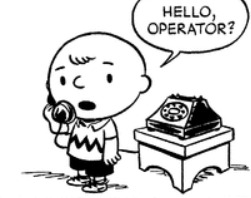
(December) 1950
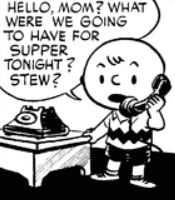
1951

1952
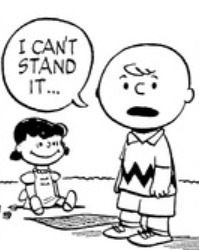
1953

1954
Linus
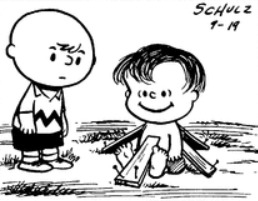
(September) 1952

(December) 1952

1953
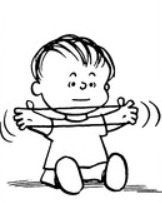
1954
Patty
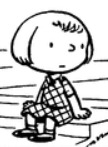
(October) 1950

(December) 1950
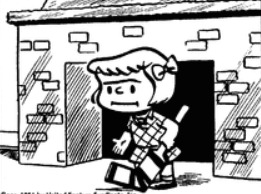
1951

1952

1953

1954
Not a huge shift in the art from last year as far as I can tell but there's still some evolution taking place.
The main difference I noticed is a reversal of the trend I saw between 1952 and 1953 where the kids were getting taller and their heads were getting smaller. Now they actually look shorter and with larger heads BUT the faces are getting smaller as well, which is a bit of an odd effect when you stop and stare at it. Additionally, I'm noticing some simplification in the kind of expressions he tends to work with. Yes, they've always been pretty simple but I think they're a smidge less nuanced than they were last year.
Now that I stop and really look at it the whole art style is getting a bit simpler. If you go back to the stuff in 52' and look for a character in an unusual pose you'll notice that the character's forms are all pretty complex and well-defined to the point where you could probably make a 3D model of the panel without much guesswork. That's still there for the most part but there are more drawing shortcuts being used than there used to be (probably for time/sanity purposes) which creates a slightly different feel. This can also be seen in many of the backgrounds which are still amazing when they want to be, but are now often fairly minimalist wit a single line representing grass or where the floor meets a wall.
Again, just to be clear I'm not saying the art is getting ~bad~, just more streamlined. It's kind of an inevitability when you work on a project like this for a long time because drawing is freaking exhausting and those little shortcuts can translate into hours of saved effort.
Art aside, this was a pretty cool year for the strip. We got Schroeder ascending to his final form as the person Lucy won't leave alone, Linus obtaining his blanket and developing superpowers, the golf tournament that went nowhere and taught us nothing, several of my all-time favorite strips, and the introduction of two equally timeless and beloved new characters. Good stuff.
Anyways that's it for 1954. Next time: 1955!
#peanuts#comic strips#peanuts comics#charles schulz#comics#charlie brown#lets read#patty#snoopy#schroeder#Linus#Lucy#Charlotte Braun#Violet
8 notes
·
View notes
Text
why the kraang in rottmnt: the movie work so well (for me)
(obvious spoilers fir the movie; if you haven’t watched it, go do so)
i’ve been ruminating on the idea of this post for a while, so instead of doing any actual writing, i have decided to spitball my thoughts on this subject
if you would like to read, go ahead. if not, okay? then don’t (/lighthearted)
i’ve seen/heard the argument a couple times from people who i’ve watched the movie with or have watched the movie that they didn’t like the kraang as villains, and/or how they were implemented
to this i say everybody is entitled to their own opinion, and if you don’t like them as villains just off of vibes, that’s fine
it gets dicey when people further elaborate. while i’m sure there are many reasons why you could dislike the kraang, but the idea that they are “bad villains” feels a bit... untrue?
so i want to explore why
to be clear, this isn’t a call-out or anything of the sort. i’m talking about a bunch of pink brain aliens from a franchise called ‘the teenage mutant ninja turtles.’ it’s not that deep (/lighthearted)
from the people i’ve talked to, the usual justification for their feelings is that they feel the kraang are one dimension. evil for the sake of being evil.
and that’s not untrue.
the kraang have one big motivation: to overtake the world. maybe they foster anger for being locked in the prison dimension, but that’s more of a ‘as well as’ type thing
but i don’t necessarily think that this is bad in the context of the story.
quite a few people who say this to me haven’t watched the series, so i can almost understand why they think this. (i’ll maybe explore that more later though.)
but to the rest, i can only assume their thought process revolves around evaluating the kraang (1) by themselves, instead of as part of a larger narrative, and (2) based off of the prevailing idea in modern media that villains must also be entirely dynamic characters with their own set of nuance.
so i’m going to explain why i disagree with both of these.
number one: evaluating the kraang as an individual part of the story instead of within the context they inhabit.
if you were to isolate the kraang as villains, i understand why you would come to the conclusion that they’re lacking. warmongering aliens hellbent on destroying the world, for no reason other than honor. where have we seen that before?
oh yeah— everywhere!
but i take issue with this. one, in defense of this, the kraang aren’t just your general baddie archetype. they do have underlying nuance.
we see in the scenes with raph (and it’s later parallel with leo) that the kraang operate off of a different moral framework than that of our heroes.
it’s not just their perspective. it’s their societal background. the strongest are those on top, the weakest do not last. a very hierarchy-based viewpoint
beyond that, though, is the fact that making the kraang more nuanced wouldn’t work within the context of the movie.
there just isn’t enough time to set something like that up, and it would only complicate and overinflate the narrative, distracting from the main themes and underlying message
the movie isn’t about them, not really. they play an important part. but they’re more of a catalyst, to force our main characters (notably leo) out of their comfort zone.
they are proving that something has to change, by taking away the sense of security (which raph is representative of) that both we and the characters had come to rely on, and in doing so, stripping back the layers to reveal the cracks more glaringly than ever
even if the writers were able to pull of a sympathetic/maybes take on the villains, i think it would be... extraneous?
the reason the kraang work so well (in my opinion) is that they are nothing like we’ve seen before. all the previous villains, including shredder, have been “fun”
you have your typical “villain-of-the-week” types (like warren and hypnotic), your bigger yet still “fun” anti-hero types (big mama abs baron draxum, who are both more nuanced) and shredder, who despite being very scary, is stilll nuanced
he’s the father of karai. his reasons for taking on the suit of armor (given to him by what we can assume are the kraang) were motivated by good. at the end, after he’s defeated, he joins karai in what constitutes their afterlife.
so we’ve had our fair share of nuanced villains. what we haven’t had?
the kraang. villains with no chance of reasoning with or goodness. villains that do not care about fun and entertainment. they are here to take over the world, and if you get in the way, they will kill you.
it’s why the movie hit so hard. why the beginning scene was even allowed to exist. if there were and peaceful option out f this, the boys would have taken it.
that’s why there can’t be.
now, this next part is much more meta, so if you don’t care, feel free to skip.
i don’t want to get too deep into this since i’m just writing my thoughts as they come to me, but it would feel amiss not to mention the bigger picture behind this criticism. why do people think this?
within the writing community, there has been this shift. actually, within the artist communities at large. it comes with post-modernism, which is a whole topic on its own.
basically, post-modernism is a response to modernism. it shows the darker side to the modern world, and the negative side of the ideas presented in the previous movement.
it’s the start of this nihilistic idea that nothing really matters, and things don’t work out like they do “in the movies.”
with it comes a level of nuance. basically, consider perspectives that you wouldn’t have before. like the villains’.
but like all movements, eventually, it has to come to an end.
if you want to know more, there is this really fascinating video essay by thomas flight titled something along the lines of “why do movies feel so different now?”
it’s very good, but basically, it explores the shift between post-modernism and this new “thing” we’re going into: meta-modernism
a name which, given the fact we had to use “modernism” for what is now the past, feels very fitting.
(it does worry me about future naming conventions a little— what’s next? neo-modernism?? lmao)
now, that’s kind of in its own vein, but the point is this: villains don’t have to be over-complicated.
if you have the time and narrative to spare, go for it. explore the villains and anti-hero’s to your hearts intent.
but it’s important to know when something is too much (like the length of this text post analyzing the villains in a movie titled ‘the rise of the teenage mutant ninja turtles.’)
don’t shy away from having a sterotypical big bad. if you’re a good enough writer, you can pull anything off. you just have to handle it in a certain way.
not every bad guy has to have seventy-thousand layers of nuance, and the rise movie is a great example of a narrative that benefits from keeping it simple.
it had a story to tell, and it did it wonderfully, enough to send fandom-altering ripples through (in my opinion) the tmnt franchise as a whole
when a movie can pull people n and make them fall in live, despite their original feelings about the show, while also wowing the fans of said show? you know it’s good.
and you have to admit: the rise kraang are scary as fuck /pos
i could get more into why the kraang work exactly as well as they do, with the surrounding context and how they changed rise, and what i do and don’t like about the movie, but this is long enough, and i’m already not going back to fix my typos, so. i’ll end it here
if you did somehow slog through all of that and would be interested in my thoughts, let me know,m. who knows, maybe i’ll actually end up doing it maybe! (/lh /j)
16 notes
·
View notes
Text
Always so weird when you see some queer millennials talking about “how conservative queer kids/teens are these days” as if assimilationist rhetoric, dumb, bad takes, and harassment are somehow only something that popped into existence in 2015 and is the sole purview of chronically online 17 year olds. For people who constantly crow about “queer elders,” “knowing your history,” and pride themselves on supposedly caring about those things, it’s incredible to see just how easily they ignore the fact that none of this behavior is new.
Respectability politics have existed in the queer movement for as long as there’s been a queer movement—they’re an infamous part of every justice movement, because it’s fundamentally a question of what equality and rights mean and how they can be obtained and ensured. The advent of the internet definitely changed various parts of the discourse around queerness alongside increased visibility and all that entails, but things weren’t better in the mythologized past that they seem to yearn for when gays were “actually radical” and apparently always acted in perfectly logical ways without any in-fighting or arguing over petty bullshit. There’s such a willingness to forget that all of the online tactics, behaviors, and ideas queer millennials project onto the Entirety of gen z were ones they themselves pioneered and still very much engage in today (and moreover, that these underlying attitudes and practices resulted from older offline beliefs, were things they learned from people older than them, and so on and so forth). There’s nothing uniquely conservative or dangerous about queer members of gen z compared to any other generation of queer people—people saying otherwise are just stuck in a echo chamber like literally everybody else and falsely believing that the worst members of a given group are representative of an entire generation’s beliefs. Saying that millennials or gen x’ers or anyone but gen z are a ~uniquely enlightened generation~ is just an excuse people use to soothe their own anxieties about aging and losing relevance, the uncertainty of the world around them, worsening economic and social outcomes, and the fact that they never made peace with their own teenage selves or the way they used to (and often still do) behave incredibly poorly to others online (note: worsening socioeconomic and political outcomes alongside increased criminalization of queer identity affect kids too, and they’re hyper-aware of this as well—these same forces exist for each generation, and is continually getting worse each year!). It’s the same stripping of nuance and autonomy that happens to every generation by the last when they reach their teenage years and young adulthood. It’s “kids these days” rhetoric with a leftist spin, but that leftist spin is only there to give a moral backing to their contempt for and sense of superiority over young people, not out of any desire to see people change or genuine concern for the teens and young adults in their lives.
Other queer people, especially queer kids, teens, and young adults are not your enemy. They’re just people, with lives, beliefs, and takes just as good and shitty as yours. And at a time in which queer rights, especially the rights and autonomy of queer children and teens, are increasingly under attack, the best thing you can do is learn to be patient, kind, and the adult that you needed around as a young queer person. Just take a moment to remember what your life was like at that age, take a look at the world around you, think about what it might be like to be a teen again with everything that’s happening now, and have a bit of sympathy and patience for the young people in your life.
#long post#long for a textpost from me at least#this is such a weirdly sticky belief for queer millennials in particular and it’s always baffled me#because it’s so obviously informed by people’s pre-existing beliefs that teens and young adults are incredibly frivolous that they don’t#know how good they have it that their opinions are shallow and dumb and ill-informed and that they don’t deserve to have opinions and can’t#challenge you. but just with a leftist twist. you’re still idealizing a mythologized past that doesn’t exist in order to justify your own#worth. i hate seeing this particular discussion because it completely misses the importance of how the internet functions in radicalization#and the way that bad takes and conservative rhetoric gets pushed on Everyone and how every age group is impacted by this in various ways#gen z queer people are no more conservative than you are and in projecting all your anxieties onto teens and young adults you miss out on#the actual issues impacting everybody’s lives and the structural causes of that online#bees posting#and don’t immediately denigrate your teenage self in response to this. you were doing the best you could with the limited knowledge and#experience you had as well. seriously just be nicer and try to look outside yourself for a second#and don’t immediately be like ‘but kids are doing a harassment and mean in my notes.’ literally everybody across all ages will do this#and be a shithead in your notes. the only reason you think this is some how unique to teens is because you hate teens#and falsely see a pattern where one doesn’t exist based on your pre-existing biases
10 notes
·
View notes
Note
Everybody, everywhere “let’s enjoy the show we got instead of complaining—-“
Oh but I will complain. I will lament. Forever in grief and mind you, in righteous anger too.
Cheers 🍻
Six of Crows was a story that was there for me during a particularly dark part of my life, and even with all my little grumbles of plot holes and wishes for what could have been in the books—it’s quite dear to me, for sentimental reasons. Also, it was just so much fun to read. I felt some semblance of joy reading the duology.
So to see the characters onscreen reduced mostly to stereotypes and tropes, and say copy-paste lines from the books without having earned the development to deliver those lines…. and have people say it’s fine or worse, that it’s to be celebrated is…blasphemous.
i’m with you on all of this!!! i mean, i am sorry, but the show was the PERFECT opportunity to improve on the source material—fix what wasn’t working, extend on existing storylines and themes, add nuance, spend more time with the characters, explore different facets of events… the possibilities were endless, and they didn’t chose to do any of that. i mean, quite frankly, when an adaptation fails to match the narrative, emotional, and thematic depth of the original material, what even is its reason for existing???? i don’t need to experience a similar story done worse. and that’s why i am frustrated with sabs2. because obviously we know they did have a solid foundation to draw inspiration from. the books are Right There. we know they didn’t have to rush through all these plot point & character development. we know they had at least the basics of a political intrigue plot at their disposal. we know they had a solid resolution for alina's arc at the ready. and with s1 they showed that they are capable of decently adapting and expanding the story. so there is really no excuse for them to mess up as badly as they did. i think it’s more than fair to complain about that. like you said, rightous anger. i am not gonna thank them for stripping a perfectly good story of all its meaning and generally doing a bad job with their characters. why should i not get to complain about that? tbh i am more confused if you feel similar about everything that’s wrong with this season and don’t complain. you shouldn't have to thank them for scraps and breadcrumbs. you should be out there acknowledging the good and the bad while urging them to do better. and just let's be real for a moment, enjoying bits and pieces of a show and complaining about the overall utterly inept writing of said show is not mutually exclusive—you can do it in the same breath.
#cheers my friend 🍻#i am not sure if people think complaining will hurt a show or????#i mean networks and streaming services only care about money not the quality of the product#and the matter of the fact is that if shows suck people generally stop watching#which leads to shows being cancelled prematurely#and i actually don't want them to get cancelled. i want them to do better.#aaanyway#anon you an me are on the same page about all of this. we'll complain and lament and grief just as much as our poor little heart desire#bc that's what we deserve to do if we feel like it <3#anon#answer#have a great day!#mish watches sab#s&b2
3 notes
·
View notes
Text
Complete Analysis On Stag And Hen Strip
In regards to planning a stag or hen do, focus on detail can make all of the difference. These minute nuances might have a major impact on how memorable an event is. Finally, organising a stag or hen party is all about the particulars that make it stand right out of the competition. An event business specializes in offering the services and supplies you need to prepare a party which will live long in the memory. One of many standout options for an unforgettable bash is the booze cruise. Picture this: you and your crew, sailing to the sunset on an outstanding vessel. That is no ordinary cruise; it's a sunset booze cruise. As sunlight dips below the horizon, painting the sky with vibrant hues, you and your mates can toast the occasion with your preferred beverages. The most effective boat party experiences often include a range of amenities to keep the nice times rolling. Music that sets the mood, a dance floor to bust your moves, and a well stocked bar to quench your thirst all on a ship floating on glistening waters. If you are seeking for more information on hen party magaluf, click on the earlier mentioned website.
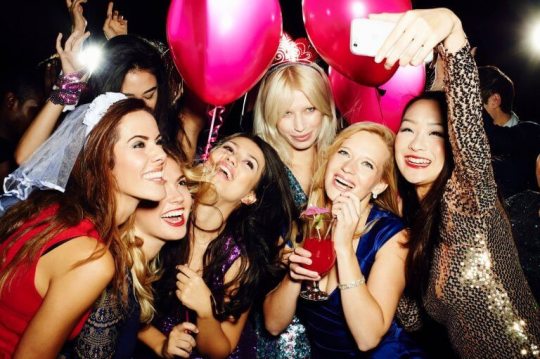
It's an irresistible recipe for a stag or hen do this would be the talk of the town for years to come. Now, let's dive deeper into what these services entail: Booze cruise may be the core of the experience. A booze cruise isn't nearly sailing; it's about creating an atmosphere where everybody can let loose and have fun. The gentle sway of the boat with the laughter of friends and the clinking of glasses it's an event like no other. Timing is crucial as it pertains to creating memories. A sunset booze cruise offers the enchantment of witnessing the sun's descent while enjoying your preferred drinks. It's the right backdrop for photos and unforgettable moments. To throw the best boat party, you'll need the very best boat. These services provide first class vessels built to appeal to partygoers.
From spacious decks for mingling to cozy corners for intimate chats, these boats are your party headquarters on the water. Whether it's the groom's last hurrah or the bride's final fling, these services understand the initial needs of stag and hen parties. They are able to help you plan games, activities, and surprises that suit the occasion perfectly. The terminology can vary greatly, but the target remains exactly the same creating a night to remember. Stag and hen parties frequently have different vibes, and these event services can tailor the ability to suit the preferences of the partygoers. As it pertains to organizing an unforgettable stag or hen do, it's all about the little things that create a big impact. Services that specialize in events like these understand the nuances, from the right timing of a sunset booze cruise to the decision of music on the best boat party. They ensure that each detail is in place, which means you and your crew can focus on having enough time of your lives. So, if you want a stag or hen party that stands apart, look no further than these event services to produce it happen.
1 note
·
View note
Text
...And they were brothers.
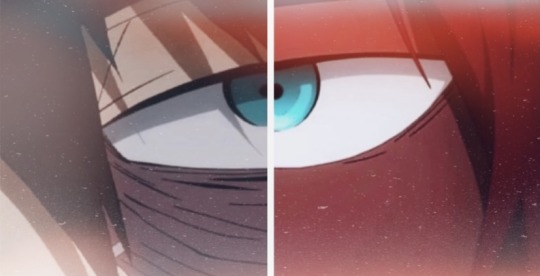
From the start, Endeavor has pitted his own children against each other. Now we’re seeing the complex dynamics of an abusive household, Todoroki Shoto Endeavor’s golden child and Todoroki Toya Endeavor’s scapegoat, play out on a battlefield. At first glance, Shoto looks like the good brother fighting on the side of the heroes, and Toya the bad brother who cares more for plotting villainous revenge than anything else. However, it’s more complicated than that: a look at abusive dynamics and the character foiling between Shoto and Toya underneath the cut.
Before I begin, a brief explanation of the golden child and scapegoat dynamic.
Abuse isn’t just a thing that happens. It’s a power dynamic. The Todoroki Household is considered an abusive household, because all the power is held by one man, Todoroki Enji. An abusive power dynamic can be explained simply as a person who uses the power they have others to their own advantage.
An abusive teacher is someone who steps out of line and acts inappropriately with a student, who they are responsible for because they have power over them. An abusive parent will use their authority as a parent to act in a way that’s not in a child’s best interests.
Abuse is also a cycle. It perpetuates itself. The reason abuse is cyclical is that, in an abusive dnyamic, fights or disturbances can’t resolve in a healthy way so usually things will go back to status quo and power will be held by the abuser again at the end of the disruption.
I’m simplifying here to try to make this as understandable as possible, but abuse is a power dynamic. It comes down to a question of: Who holds power in the household?
In the Todoroki Household, it’s Todoroki Enji who holds all the power.

In a narcicisst’s household, everyone exists to serve the narcissit. This is quite literal in the Todoroki Household. Enji only had children so they could take on his dream of being number one hero and he could live vicariously though them.
Let’s strip away all the fantasy paint in this scenario and define it in more realistic terms. Enji thinks he is entitled to something: the title of number one hero. Enji is unable to handle the feelings of being denied the thing he wants, so instead he sets up a family.
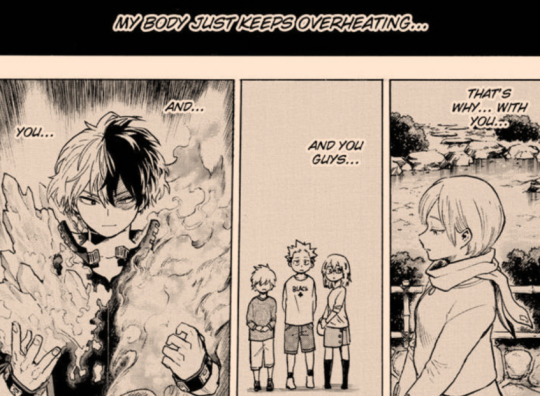
Enji’s family exists for his emotional benefit. He expects his family to “give him something.” He only had a family in the first place, because he thought he was denied what he was owed. Enji had a family for selfish reasons, and thought they existed to fulfill his ambitions, his intention from the start was to use them. So, it’s no wonder more traditional forms of abuse (wife beating, child abuse) rose out of these circumstances. The Todoroki Household is built by Enji, and at the center is Enji a narcissist.
(I do more nuanced takes on Enji’s character in other meta, but this isn’t the time or the place to talk about it here).
The household is centered around Enji, he’s the most powerful person in the house, and he expects the household to give him what he wants. When he’s denied what he wants, he’ll rely on abusive tactics to get it.
There are many types of abuse. Tactics used by abusers include: private criticism leading to doubt and hurt; public criticism leading to shame or humiliation; threats of emotional or physical withdrawal leading to abandonment; withdrawal of money or sexual contact that leads to a devaluation of financial power or decrease in sexual self-esteem; verbal threats that can begin a process of fear; verbal and physical tirades or tantrums (i.e., power displays) that can leave the victim feeling helpless; and finally, physical aggression that can lead to fears of physical death.
In the process of a relationship where a man uses these "tactics" on a woman, any or all can be used in any order, at any time. Usually in the beginning of the relationship, criticism and withdrawal are the two most used tactics that lead the man to have an increased sense of power and control, and the woman to have a decreased sense of power and control. [Source]

Endeavor is denied what he wants. Endeavor gets impatient.He denies that Shoto is even properly in pain, and claims he is just faking it. Endeavor uses physical aggression as an intimidation to get Rei back in line. We also know this happened, Rei fought Endeavor hard for Shoto’s sake at first, but over time became more fragile and more mentally unstable.
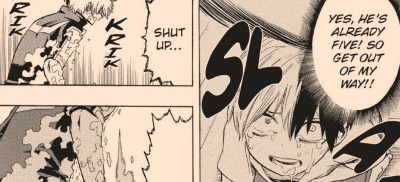
My point is not to detail Endeavor’s abuse because we already know it happened, but to show the underlying motive behind the abuse, abuse is a pwoer dynamic, Endeavor was acting to maintain total authority and control in the household. For the narcicisst everything in the household exists to fulfill the narcicisst’s needs.
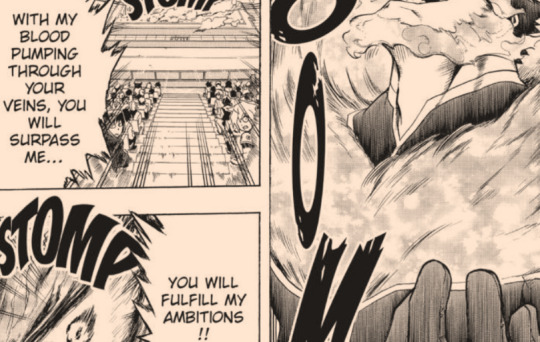
The children as Enji sees them all exist to fulfill his ambitions, so he can live vicariously through them, therefore he doesn’t see their pain. He doesn’t see outside his own ego, because tending to Enji’s needs comes first. He scapegoats one child, ignores the other two, and then the child he does pour his love into he cannot see how much his love and attention is actively harming this child. When Shoto doesn’t want to accept Enji’s attention, he sees Shoto as ungrateful and rebellious. How dare you Shoto, I’m putting all this time and effort into raising you, I’m giving you all of these advantages in life and you don’t repay me????
My point in going into this much detail is that no matter what happens, or how the victims turn on each other in the household, the architect of the abuse, the one who created this situation is Enji. If the victims blame each other, then it benefits Enji because his position at the center will remain unchallenged.
Which is why...
“It’s not better or worse to be the golden child. Both face the psychological whiplash of being raised by a narcissist. The GC becomes the conformer to the extreme, with the intense pressure to measure up, and when they don’t they receive cruelty. The SG becomes the rebel who receives almost constant cruelty and shaming.
The scapegoat and golden child are created because the abuser has a set of impossible to fulfill and aribtrary standards. One of thsee children meets those standards and one of those children does not.
Why divide people up like this, though?
As I said, it’s a power dyanmic. We have already seen this play out in canon once before in the richly detailed telling of the Shimura Household. A household where abuse is taking place will be an unstable environment, because it exists at the whim of an abuser. If there are more than just abuser and victim in the house, people will inevitably notice the fractured mood. This is exactly what happened in the Shimura household, there was a problem that everyone saw but nobody talked about.

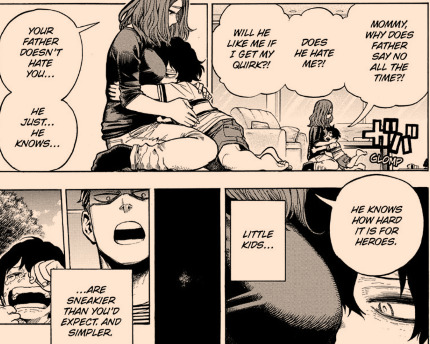
The Shimura household was constantly being disrupted by Kotaro’s abuse on Tenko, however, an abusive dynamic maintains itself by denying the abuse. Rather than confront Kotaro who holds all the power in the household, the weaker Tenko is blamed. This is Tenko’s issue that clings with him all the way until adulthood, instead of just calling his father out for his improper behavior, his family all sided with his father and told Tenko to stop picking fights.
The process will continue as long as the man denies the impact of these tactics on the woman and the woman also denies being victimized. He will deny the impact because of acculturation and insensitivity; [Source.]
Instead of challenging the abuser, the victim is told that it is his fault, he needs to stop provoking the abuser, he needs to stop crying, he needs to stop being so sensitive, the feelings of the abuser are catered to over that of their victim and the dynamic is miantained. By finding a scapegoat to blame for the unrest in the household that is happening because of the abuse, nobody ever challenges the abuse directly.
In other words divide and conquer. If the abuser pits victims against each other, it’s practically guaranteed that nobody will challenge him or confront him on his behavior and he’ll continue uninterrupted. So, in the Todoroki Household where there is a golden child and a scapegoat it continues like this:
So in the family, the Scapegoat and the Golden Child become these roles assigned by the narcissist in order to play the game of Extract Narcissistic Supply through Triangulation.
Triangulation is like driving a wedge between people. Basically, the game involves two or more people who get pitted against each other and usually they don’t even realize what’s happening. They’re just aware of the conflict between each other and there’s always this conflict. [...] The narcissist wants the loyalty of everybody and the narcissist wants everybody fighting amongst themselves. [Source.]
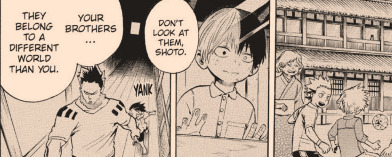
This is why every Dabi fan in the series is saying that Shoto, and Toya were set up to fight against each other, because they were. Enji keeps Shoto separated from his siblings, to maintain control. The scapegoat will blame Shoto for his circumstances believing if they hadn’t been born their fathers attention would be theirs, and the golden child will blame the scapegoat for their rebellion, and their own actions done in reaction to the father’s abuse. HOWEVER. In fighting each other. blaming each other, it is Enji who will escape ultimate blame.
Which is why ultimately scapegoat and golden child don’t really matter, they are both victims of the same abuser. Shoto and Toya are the same in the way they were abused and their reactions to abuse, it’s only circumstances that differ with them.
1. Shoto and Dabi Is the Same
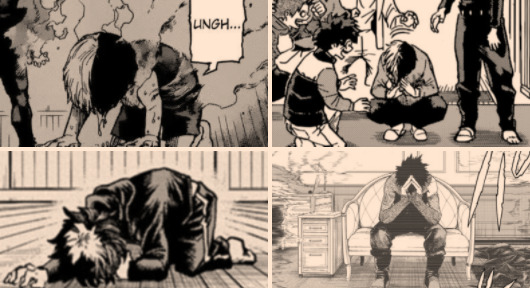
Edit by @miriio
Shoto and Toya are the same, not just because they’re both brothers with the same fire quirk, but because they’ve both been moulded by Enji their entire lives, and their personalities, values, are all in reaction to that. Abuse scars everyone it touches. Arguing about whose scars are worse are besides the point, rather Shoto and Toya mirror each other because they both cope with the stress of abuse in similiar ways, despite their entirely different positions in the household.

In chapter 204 when faced with a foe who won’t give up, Shoto Todoroki flashes back to his father, and begsin to use his fire qiurk.

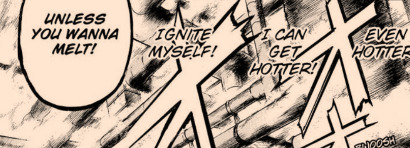
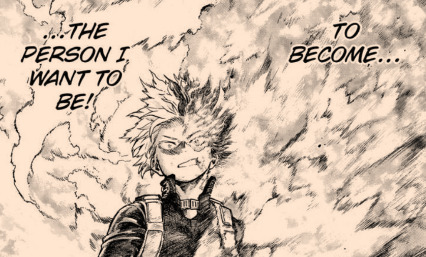
We are shown earlier in this chapter Enji’s attempts to once again assert control over him. Enji texts Shoto multiple times having gone behind his back to get his number. Enji insists that he be the one to teach Shoto prominence burn. (Enji also uses the tactic of understating the past abuse saying he was “misguided” in the past). Shoto while fighting against Tetsu^4 is also fighting against the memory of his father, and uses his flames to his absolute limit in order to prove that they are his flames. He even goes so far to warn Tetsu that he’s not holding back and could cause severe burn damage to his body.
This also mirrors an earlier behavior when Enji pushed Todoroki before his fight with Sero, he overdid his ice quirk to the point of freezing the entire stadium. There’s an idea with Shoto that just because he is starting on the path to healing, and learning to cope healthily, that he never lashes out, or responds to his his father’s violence with violence. That is simply not true.
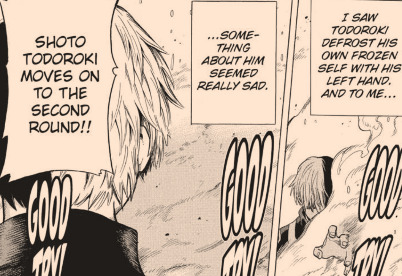
Shoto’s character arc is not complete. He is still dealing with this. As far back as the fight against Class B, he was getting what look to be trauma flashbacks in the middle of the fight, and could have even possibly been triggered by Tetsu’s relentless beating down on him.
Shoto and Toya maintain a similiar pattern of behavior, in that they intentionally are docile, and hold back their strength in a fight. Shoto used to never use his flames at all. He also usually uses them far less effectively than his ice quirk.
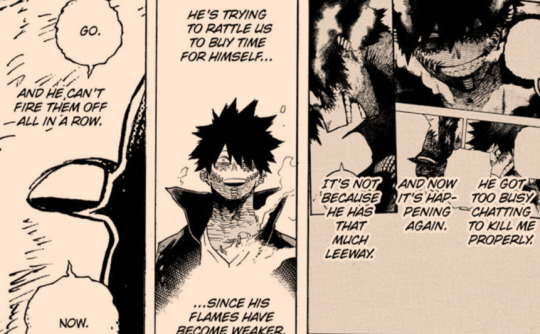
Toya also, uses his flames sparingly in a fight (albeit for different reasons, his flames will burn him as he has no way of cooling himself like Shoto). However, when pushed in the situation, especially emotionally he will go all out. He’ll use the fire with far less regard for who he burns or even for burning himself.

Toya doesn’t use his flames at all, until he does and then he has no sense of moderation.
Besides the way they use their flames, and their bad relationship with their own flames, (Shoto holds them back, Toya is burned by them.) They also both tend to overuse their quirk when they get emotionally riled or are lashing out. Their fire is a metaphor for their emotions, but more on that later.
Shoto and Toya exhibit several behaviors, the similarities are especially strong between Shoto and Earlyroki. First and foremost, they both insist on doing everything alone.


They’re both (Dabi, Earlyroki) highly individualist people who purposefully distance themselves from others, and deny any closeness to others because they need to feel strong on their own.
Shoto and Toya are people who have lived their entire lives fighting their controlling father over agency over their own lives in different ways. Toya fights Endeavor’s rejection of him, and Shoto fights Endeavor’s smothering and insistence that he take his legacy. The reason they cut out everybody else from their lives is because (1: their father dominating and controlling them they never learned to make connections with others, 2: they live their entire lives focusing on battling against their father).
However, the methods they use to fight their father are what their father taught them, because ultimately it’s all they know. Children who are raised in an abusive household grow up improperly. They don’t know healthy means of dealing with their emotions because they are never taught these. Developmentally, they are stunted and this can even have effects late into an adulthood so it doesn’t actually matter that Dabi is in his twenties (especially since he died in his teens).
Shoto, and Dabi are to an extent what their father made them to be. They are staunch individualists, who rely on the strength of their quirk to get what they want, like being the strongest truly is the only thing that matters. This behavior is shown in the both of them, but especially with Earlyroki. There are parallels. The way they both deal with small fry villains.


The scene where they both take out minor villains by entirely dominating them with their quirk is a parallel set up between the two of them.
They also both have a tendency towards dissociation to try to deal with past trauma: IE, trying to move themselves away from their feelings and insist their not feeling anything in order to avoid their feelings.
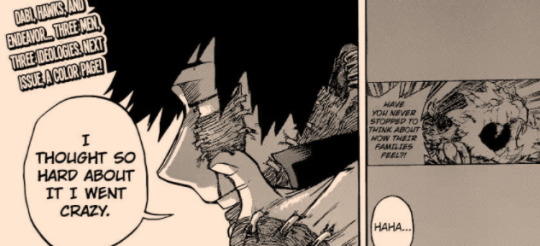

At their worst, Shoto and Toya show off several of the same behaviors. These are all symptoms of abuse. Their shared inability to regulate their own fire is a metaphor for the fact that neither of them were taught how to properly regulate their own emotions.
A healthy adult is able to handle stress, and negative emotions in healthy ways. They can put a lid on it, deal with it at a better time, think and sort through them. Shoto’s emotions always, always, always, come out during a fight even if he insists he’s letting go of the past and his father. Dabi and Shoto show behavior where they are either completely emotionally remote and unreachable “off”, or they are flipped “on” and completely unleash themselves. The point of these states of being is that Toya and Shoto are themselves unstable, because they were not fully developed emotionally, because they did not grow up in a household where their emotional well being was put first and foremost.
They grew up in a household where they catered to Enji’s emotions first and foremost, and because of that both Shoto and Toya have trouble finding themselves in their fire. They also show several other symptoms, dissociation, social isolation, and a belief that they have to be strong and handle everything by themselves. Dabi cannot accept cooperation, and neither could Earlyroki. IN effect, Dabi is still fighting against the idea that he is weak that was beaten into him by his father, so of course relying on others is the sign of that same weakness. They both let their flames burn because they feel the need to be strong.
2. Shoto and Dabi is different
I am making the argument that they are emotionally very similiar, and they both are who they are in reaction to what Endeavor did to them. They just take a different tack in the way they frame themselves. Dabi the villain, Shoto the hero.

Shoto mentions very early on his quirk could be used to kill people, but he won’t, because that’s not a heoric action to do.

Dabi says that he’s killing these villains for a purpose. We learn later what that purpose is, to get his body count up to thirty in order to further stain Endeavor’s name.
In other words, Shoto fights against his father as a hero, Toya fights against his father as a villain. This also reflects the golden child / scape goat dynamic. Shoto on the whole conforms, Dabi on the whole rebels. Shoto is still in the middle of hero society.

Shoto’s strategy has always been that he has to work around Endeavor to get what he wants, which leads to Shoto cooperating with Endeavor on many occasions. He interns with him because he’s the number two hero. He often has his boundaries violated by Endeavor wanting to act like father son in public and Shoto not being comfortable with that.

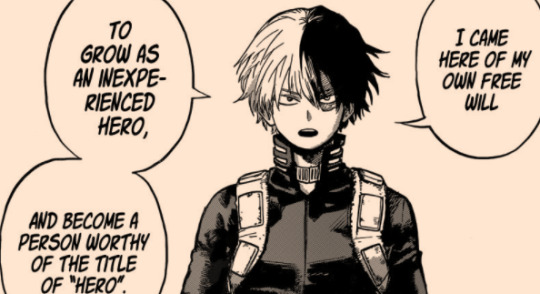
Shoto’s strategy is to exist within the same framework that his father created, but learn to be his own hero. In this strategy he gives Endeavor what he wants almost as a trade for what Shoto still needs, which is practice and training to become a hero on his own terms.
The golden child conforms, the scapegoat rebels. Shoto tries to accomplish what he wants inside of hero society, whereas Dabi pushes his agenda as a villain. Shoto lives to become a true hero, and wants to become a hero for his own reasons not because his father pushed him to, but because All Might inspired him.
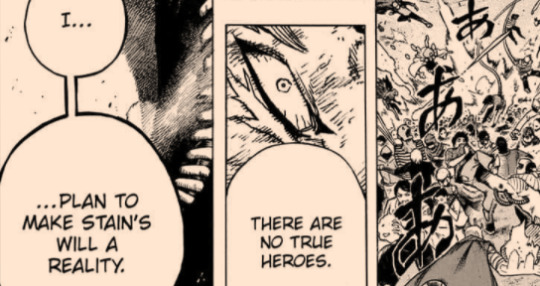
Toya not only declares that there are no true heroes, but he dedicates everything to tearing down what he sees are false heroes. His strategy is one of rebellion. Toya is aware of the arbitrary and hypocritical labels of hero and villain in this society, and because of that goes out of his way to show someone how villainous the actions of a hero can be.
However.
Shoto wanting to become a hero.
Toya becoming a villain from necessity.
Isn’t as black and white as it seems. Toya has what Shoto lacks, which is awareness, the ability to criticize society and the situation he was in. Enji isn’t the only one to blame for the abuse of the Todoroki household, the society that allowed it to happen is also to blame. Shoto is capable of unknowingly inflicting violence on people who are just like him victims of abuse because he lacks Toya’s outside perspective.

Shoto, that kills people.

Shoto, that also kills people.
The point being it easily could have been Dabi that Shoto stabbed to death with an icicle, or burned alive to the point where half of his body was smoking. It could have been Dabi who has the same scars as him, who was burned by the same man. It’s only chance that he was going all out against Shigaraki instead of Dabi. Shoto can’t see villains as victims of the hero system, even though he was a victim of the same system.

Shoto hesitates when he learns that it’s Toya but what is the difference here? He was ready to use lethal force on Shigaraki a moment ago. Has anything truly changed? Dabi is still an enemy trying to destroy hero society. He still kills innocent people. He’s just now a villain that Shoto happens to know personally.
My point is that Shoto’s conformity can set him up against victims of the same society. The same way that, Dabi’s rebellion can lead him to harm his own family.

Dabi’s rebellion is just lashing out. The scapegoat because they are the lowest position in the whole family, because they are isolated, can sometimes associate the abuser’s actions with the whole family. We saw this with little Tenko. Tenko resented both his abuse father, but also his little sister for tattling on him, his mother and grandparents for not comforting him and taking any steps to stop his father. When you are the lowest rung on the ladder, when the stress of the whole household is taken out on you, you tend to see every member of the family as the same.
Dabi absorbs the stress of the whole household. When he inevitably retaliates because nobody can keep that stress inside of them, and Dabi has been taught no healthy means of dealing with that stress, he is pitted against both other members of his family and Endeavor himself.

Dabi’s rebellion will hurt other people in the household, he has no regard for Shoto whatsoever, he sent Ending to Endeavor who ended up kidnapping Natsuo, he also is probably going to cause Rei’s setback.
However, at the same time Dabi’s lashing out is inevitable. Dabi was made to bear the stress of the entire household when he was blame and ousted as the scapegoat instead of his father Endeavor. Dabi is dealing with those emotions alone, lashing out on them alone, he only sees his own pain, but that is because to begin with, and all this time he has been suffering alone.

That’s where we get to the main difference between them, Shoto now has support, and Toya doesn’t.
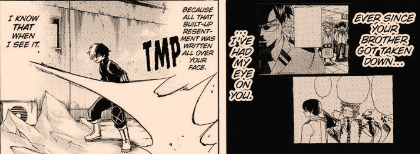
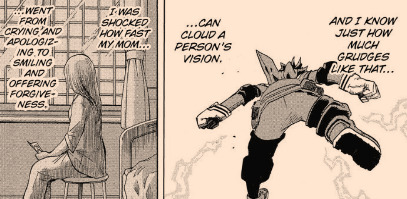
Shoto even says back as early as the stain arc, which is the arc that Dabi first emerged in the aftermath of, that the problem with Earlyroki is not that he was angry, but that he was dealing with that anger all alone. He says it, that being all alone warps your vision, to the point where you can only see yourself.
Dabi is cut off from others, he might care about them but he severs those feelings away from himself. He has been isolated at least since he died, and maybe all his life, and even the connections of the league can’t bridge the gap between himself and others. Dabi is someone stuck in permanent Earlyroki phase because to him he lives his life for one purpose.
Shoto has been allowed to develop as his own person, because he let others in. The biggest difference between them can be illustrated with their fire. Dabi says his flames are Endeavors flames. Shoto is told that his flames are his own.
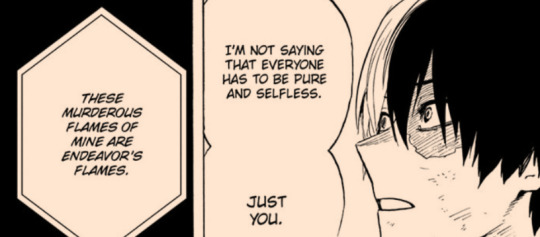
However, Shoto did not reach this consclusion on his own. He was told this by someone else. Shoto could not even take the first step until someone showed him the way, so who is to say the same can’t be true for Dabi?

Dabi has been separated from his family, homeless for ten years, and he literally died that one time. It’s likely that in all that time nobody has told him something so simple as “Your flames can be your own.” Dabi doesn’t know he can have a life outside of revenge against Endeavor because he hasn’t been shown it, he’s only ever known his father’s abuse and his fight against it. We don’t know if the league can reach him or not because he hasn’t been entirely honest with the league until right this second.

There’s a reason that the camera is cut like this.


Shoto’s scar, the damage inflicted on him, and Enji’s unscarred side. It makes a point. Is Dabi really the enemy in this situation? Is Dabi the ultimate villain? He plays the mastermind but he’s not.
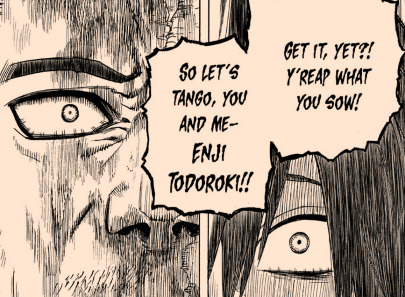
Both Dabi and Shoto were burned by Endavor’s flames. It was Endeavor who created the situation and pitted them against each other in the first place. Which is why hero or villain, golden child or scapegoat it honestly, should not matter. Dabi and Shoto are not each other’s enemies, they were just made to think that way by Endeavor’s actions all the way back from when they were kids.
If Dabi is blamed for his own rebellion. If he’s villified for it. If Dabi is made out to be the bad one for reacting the way he did, then, it’s no longer Enji’s fault for abusing him in the first place. After all, Natsuo, Fuyumi, and Shoto were similiarly abused and they didn’t react that way. Maybe Dabi just had bad vibes. If Dabi and Shoto are fighting each other, neither of them are fighting Enji, and the society he represents which enabled Enji’s abuse. While victims blame each other for their own reactions they don’t confront the abuser.
Endeavor burned them, and Shoto, and Dabi are coping with those lifelong burns in different ways. Instead of trying to kill each other, they have much more to gain from sympathizing with one another. Shoto’s path to become a hero and surpassing his father, should take the course of being a hero who rescues. We’re even shown in this arc how horribly violent Enji is towards Shigaraki, a victim of similiar abuse to Shoto. Shoto would become a better hero, from listening to Dabi’s perspective and learning about the flaws in hero society. Whereas, Dabi needs to learn that he has a future beyond dragging his father to hell with him. Shoto was only able to open up to other people because someone forced their way through his walls and told him that his flame was his own, and Shoto can be the one to open Dabi’s eyes that his flame can be used for more than just destruction.
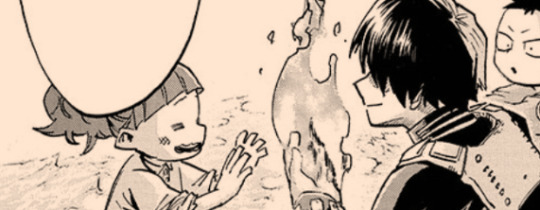
Shoto’s desire for a hero is not wrong, Dabi’s desire to confront Endeavor’s abuse is not wrong. Both of these things are necessary. To make a person stop behaving badly you have to confront them about your behavior. However, it’s not healthy to linger in your pain forever because you won’t be able to move on and heal.
Shoto is someone who can tell the all important words to Dabi. Your flames are your own. Didn’t you want to be a hero?
PS. It’s really hypocritical to say that Dabi is wrong for announcing what Enji did on public television, like... Shoto tells his backstory to literally anyone who asks. Fuyumi casually discusses the fact that Natsuo thinks their father killed their brother with Shoto’s two friends from school. THEY ARE ALL LIKE THAT. THE TODOROKIS WILL TALK ABOUT THEIR DRAMA IN FRONT OF ANYBODY.
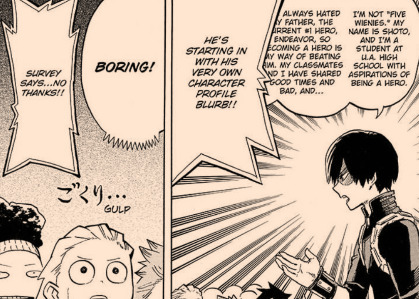
#mha meta#todoroki shoto#todoroki toya#todoroki shouto#todoroki touya#touya todoroki#shouto todoroki#dabi#shoto todoroki#todoroki family#tw: abuse#fuyumi todoroki#natsuo todoroki#rei todoroki#character foils#shoto dabi foils#todoroki dabi foils#todoroki dabi#dabi todoroki#my hero academia meta#my hero academia theory#my hero academia analysis#my hero academia character analysis#bnha 290#mha 290#bnha spoilers#mha spoilers
614 notes
·
View notes
Note
You make such weird posts about Dutch, in one you defend him, and then in the other you completely bash him.
well, yeah? i dislike him for his actions in later chapters, but i also like him for the glimpses of the kinder dutch we see in the earlier chapters. he is not 100% good or bad. he just is. he is like a person.
i also think a lot of people in this fandom tend to sort of... ignore canon in favour of taking a grey character and acting like he's just 100% evil. so i bash him, but i also sometimes vent my frustration with people who bash him for things that just... aren't true or in line with canon.
dutch is very complicated character and i love that about him. i played rdr a few years back and absolutely despised him, and when rdr2 came out, i was convinced that r* would not be able to make me tolerate him in the slightest. but i was proven wrong, and i really think r* managed to make him sympathetic, likable and really underlined the change dutch has gone/goes through in his life.
i think that dutch was once a good person, and actually tried/tries to be one, only to spiral and just become a worse and worse version of himself, until he's turned his back on everything he once believed in.
the way he acts, what he does and says, especially in chapter 4 and onwards, is just so despicable and gut-turning, and there are definitely glimpses of this dutch in the chapters before that, but then you also hear the way hosea and tilly and uncle and, honestly, everybody else talks about him in the earlier chapters, and you see the kind and good things he does/has done (like having swanson around despite his problems or making sure jake adler was buried properly, just to name a few).
i just really hate how people seem to just go with the quite frankly lazy take that is "dutch is a bad guy in the end and therefore he was always bad". i mean, i have already talked at length about how annoying i think it is, that the fandom is so desperate to paint everything in black and white and how the lack of nuance completely strips all characters of anything interesting about them, whether that be hosea not having a single damn flaw apparently, or people accusing r* of writing javier out of character because he *gasp* sides with dutch in the end.
acting like dutch was always evil and manipulative and only looked out for himself is just completely ignoring canon, and on top of that, a lot of the meta written by people who believe dutch was always evil is incredibly contradictory.
like, i've literally seen someone reblog two different posts talking about dutch, one of them talking about how dutch never goes on any missions (which is untrue) and therefore no one looks up to him, and the other talking about how dutch only goes on missions because it makes him look good and that's why people look up to him.
i've seen people say that it's dutch's fault that everything went awry because he wanted to do the saint denis bank job, but it was hosea that wanted to do that. don't get me wrong, it was dutch's fault that the city was filled with cops because he murdered bronte, but he was convinced by hosea and arthur to do the bank robbery after.
people constantly talk about how he always talks arthur down and gets angry with him when he doesn't agree with him, but that's just also blatantly untrue. like, it's so obvious that dutch and hosea are used to butting heads and arthur is brought in as the tie breaker. there are multiple times throughout the game where arthur is put in that exact positio; sometimes he agrees with dutch, sometimes with hosea, and either way they usually do what arthur decides on (at least in the first few chapters).
like, if you're going to hate dutch, do it properly at least?
on the other hand, acting like dutch is somehow redeemable after everything he did, or blaming his downfall on a hit to the head is equally as ridiculous and once again completely ignoring canon. there are warning signs from the very beginning, questionable moments and decisions from his side that highlight his narcissism, and how he views other members of the gang.
i have less to say about this because i see metas from this "side" less often, but know that i am just as much against the idea that "dutch was always good actually, he's just misunderstood" as "he's always been evil."
also, like, i think a big part of this fandom has the "jk rowling character problem", where a character is deemed good or bad from the beginning and from then on they are just good or bad. character's actions are not what contributes to how we should view a character, no, an action is only ever either good or bad, and whether that action is good or bad is not determined by the action itself but rather by which character carries it out.
like, for example, arthur telling javier that bill has every right to be angry and aggressive is fine actually because arthur is a good guy, but dutch telling bill to shut up while defending indigenous americans is bad actually because dutch is a bad guy and is just manipulating people.
(also, if you sent me this on account of the mary-beth post i just made – that was not about dutch. dutch flirting with mary-beth is gross and weird and wrong. the post was about me feeling like people project onto mary-beth and give her characteristics she doesn't actually have.)
#this is the second time i've received an ask like this#is it really that confusing?#rdr2#dutch van der linde
18 notes
·
View notes
Text
Sometimes I think I'm not multiple at all and then I start thinking about whether involuntary hospitalization is moral or not and come to the conclusion that it's much more complex and nuanced than "yes" or "no" and largely depends on the individual in question and the confounding factors of the financial, emotional, and social burdens of hospitalization as well as the stigma and how sucky most hospitals are.
And then someone in my brain is like "No actually you're literally a shill for the psychiactric industrial complex by ever insinuating that something as horrible and traumatizing and involuntary treatment could ever be okay" and I'm like "Wow man that actually kind of hurt, are you saying I'm a bad person for saying this is a nuanced issue?" and then he's like "Yes, because you're literally excusing the stripping of agency and human rights from mentally ill people and calling it "nuanced" when it's never okay in any context. Hey everybody look at this idiot, I can't believe he works where he does," and then I'm like "dude I literally share a brain with you" and then he's like "No you don't. Actually if you're not completely anti-psychiatry by this point I want literally nothing to do with you" and then I throw my hands up in the air and scream
#I'M FINE I SWEAR I'M JUST GONNA GO DO CHORES#Tfw the Tumblr brainrot gets into your mind and your brain just makes a guy out of it#I know the normal advice is to work on system communication and shit but every time I interact with this guy I just get angry lmao
8 notes
·
View notes
Text
The New Half-Truths about Corsets

As true as it is that corsets are often misrepresented in audiovisual and written media, and as glad as I am to see people defending them, GOD, am I annoyed by the current discourse. Not because the defenders are wrong —they’re not, in general terms—but because Twitter, Instagram, and their incentivitization of easily digestible sound bites over nuance haves stripped the conversation from all the complexity inherent in a subject as big as corsets. In seeking to be more accurate, corset defenders have often just muddied the water further, with a brand-new set of half-truths.
Here are my favorite (least favorite) talking points.
“Corsets are literally just bras!”


As a cis dude, I’ve never had reason or occasion to wear bras. I have worn corsets, though, and let me tell you, things like having to take off one’s boots after one has been out in the snow while wearing a corset is work—moreso, I imagine, that if I’d been wearing a bra. Actually putting on boots before a corset? Even harder, enough that “boots before corsets” is a common bit of advice. Corsets aren’t torture, but they do force one to rethink how they interact with the world, in ways different than bras do.
To be less glib though, yes, corsets could and did provide the sort of breast support that is now provided by bras. This doesn’t render the multiple differences irrelevant! For one, breast support is the one thing bras are meant to do: with corsets, it is secondary or even inessential, evidenced by all the corsets that do not provide breast support, such as corsets for men, old-timey corsets for kids, and underbust corsets, which are still definitely corsets.
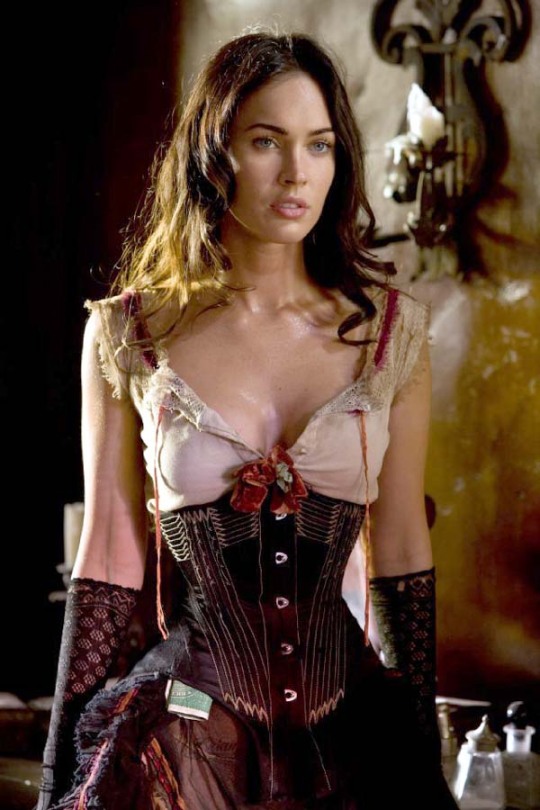
(Megan Fox in Jonah Hex, wearing a corset that is doing exactly the same thing as a bra. Yes, I know it’s not historically accurate; that is not the point.)
What most miffs me about this argument is that it is exceedingly reductive, and displays simplistic thinking regarding both corsets and bras. Because yes, corsets were like bras…and? What is this argument trying to say, given that bras their own baggage? Is the argument that corsets aren’t torture because corsets are bras? Plenty of people find bras uncomfortable, and something to be abandoned as soon as it becomes feasible. Corsets were purely practical because corsets are bras? Plenty of bras exist for primarily aesthetic purposes—some even do a fair amount of shaping. In the end, both garments have complicated, multifaceted, and distinct features, histories, and semiotics, and trying to equate them in a single sentence says nothing useful about either of them.
“Stays are not corsets!”


Amusingly, this argument seems somewhat incompatible with the previous one, given that stays have much more in common with corsets than with bras, but here we are.
Yes, 18th- and early 19th-century stays are significantly distinct from the corsets that we see later in the latter century, and if someone wants to don Bridgerton-inspired looks that accurately reflect Regency fashions, they should not look at Victorian corsets to obtain it. And yes, one can make the case that stays and corsets were entirely different animals.
Here’s the thing, though: historically, that’s not a case that people made. Corsets are we know them weren’t considered to be a completely different thing from stays, but rather a different style of stays—two different breeds of dog, perhaps, but dogs all the same. Once the term corset entered regular parlance, the two terms were usually used interchangeably, as can be seen in multiple 19th century documents, including technical ones where differences between the two, if they existed, would have been noted.
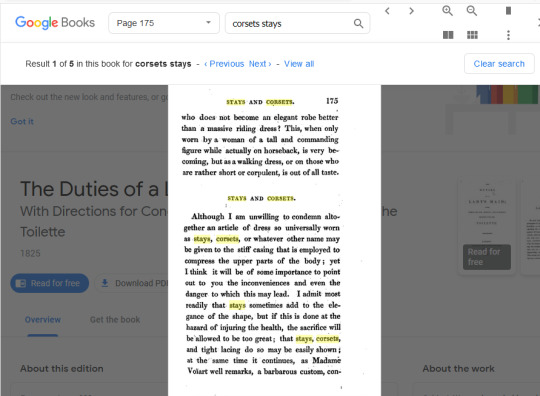
The Duties of a Lady's Maid: With Directions for Conduct, and Numerous Receipts for the Toilette (1825)

English Patents of Inventions, Specifications, 1865, 3186 - 3265 (1866)
----
What’s more, it’s not until very recently that people began treating stays and corsets as altogether different things. Gone with the Wind, the book? The terms corsets and stays are used interchangeably. The Oxford English dictionary? Describes stays as a sort of corset. The longest-lasting site dedicated to corsets on the internet calls itself the Long Island Staylace Association, with no indication that doing so represented an inaccuracy on its part. Sure, Elizabeth Swann should have properly said “You like pain? Try wearing stays”—at least it one wanted to be more accurate (if not good: good writing is partly about making oneself understood). But speaking here, and now, looking backwards? Very few people are trying to be that precise.
Additionally, it’s worth noting that corsets have had a variety of styles and features throughout history, and the term is by no means exclusive to what we most often see as corsets. The S-shaped corsets from the Edwardian era are very different from Victorian corsets, as are the more girdle-like garments that followed. While not everything is a corset, I’ve yet to see a convincing argument that the term isn’t broad enough to include 18th-century stays.
Tightlacing, Part 1: “Almost nobody did it”


Statements about tightlacing annoy me more than most, largely because they involve clearer instances of wrongness, but also because they hit closer to home.
Tightlacing has always been an imprecisely defined term: Lucy Williams, one of the best-known contemporary champions of corsetry, talks a little bit about the various ways the term has been used in her post “Waist Training vs Tight Lacing – what’s the difference?” found on her site. Usually, it refers to a quantitative measure—your corset must reduce X amount to be considered tightlacing—although recently, the discourse appears to have adopted a more qualitative definition, applicable to any instance where someone is shown displaying discomfort at being laced into corsets, regardless of how tightly they are (or aren’t) being cinched.
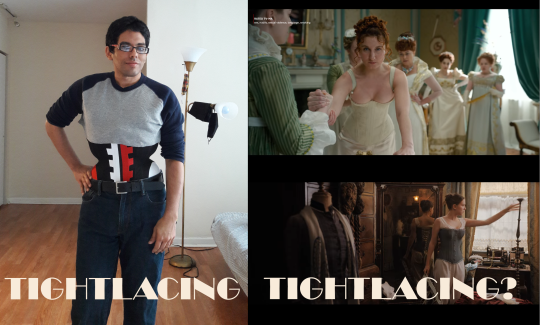
(Left: Moi, wearing a custom corset from The Bad Button Corsetry; Right, Upper: Scene from Bridgerton; Right, Lower: Scene from Enola Holmes)
----
Take, for example, the scene that has most recently caused a stir, from Bridgerton, where the character Prudence Featherington is seen grimacing as she is laced into her corset stays corset, while her sisters wince in sympathy and their mother, Portia, insists that she be laced tighter. Others have raised objections to this scene, focusing mainly on the fact that Portia’s mania for a smaller waist is anachronistic and makes little sense given fashions that de-emphasize the waist, but fewer have noted that for all the hemming and hawing that is being done by the characters, Prudence’s figure is ultimately not all that compressed, and seems perfectly in line with everybody else’s. Is what is been done to her tightlacing? A lot of people appear to think so! And yet, that assertion carries some implications. If Prudence is being forced to tightlace here, is everyone else with a comparable silhouette (again, pretty much everyone) also tightlacing? The answer is kind of important, especially if one also wants to claim that tightlacing was rare.
It’s worth noting that Valerie Steele’s The Corset: A Cultural History, one of the seminal works on corsetry throughout history, doesn’t actually attempt to make a case for the rarity of tightlacing. What it does attempt is to determine the accuracy of claims that women regularly laced down to 18 inches, 16 inches, or even smaller measurements, which is not quite the same thing. When exploring the question by looking at collections of surviving corsets from the era, the book has this to say: "Statistics from the Symington Collection [...] indicate that out of 197 corsets, only one measured 18 inches. Another 11 (five per cent of the collection) were 19 inches. Most were 20 to 26 inches.” While Steele readily admits this is hardly conclusive evidence, she took it as a sign that women with 16-inch waists were nowhere near as common as accounts suggested they were. Case closed, asked and answered, no one tightlaced, right?
Well, no.
Again, it comes down to definitions. Even speaking quantitatively, very few people define tightlacing as “lacing down to nineteen inches or fewer” (certainly no woman in Bridgerton is that tightly laced). The consensus, rather, is that tightlacing is not about the size of the corseted waist, but about the size of the reduction. How much people cinched, however, cannot be determined by looking only at corsets, because doing so requires not only those corsets’ measurements (and even those don’t tell the whole story, given that they don’t necessarily indicate how tightly they were worn) but also the starting measurements of the people wearing them.
In other words, say someone with a 33-inch waist uses corsets to reduce their waist measurement to 25 inches. This, according to most definitions, would be considered tightlacing—a 24% reduction!—and yet the absolute measurements would be nothing to write home about. How is that reflected in Steele’s sample of corsets? Impossible to say. A 25-inch corset could also be worn by someone with a natural 27-inch waist.
What, then, can we say about the frequency of tightlacing? Well, if we’re talking about dramatic reductions of, say, more than four inches (a two-inch reduction, by the way, can look like this—again, more dramatic than what we see in Bridgerton) one can say, with a fair level of confidence, that it was probably not the norm. And yet, “not the norm” is itself a very broad category, and given the numbers involved, “a minority of people” can easily still be “loads and loads of people”, as seen, for example, with COVID-19. Even if two percent of the population who wore corsets tightlaced, that’s still hundreds of thousands of people—hardly “almost no one”, as some argue. And if wearing corsets as seen in Enola Holmes or Bridgerton counts as tightlacing, the number becomes even higher.
Tightlacing, Part 2: “Tightlacing is bad”


Perhaps not coincidentally, another element of the current corset discourse involves taking all the baggage usually assigned to corsetry in general and applying it to tightlacing instead. Corsets are not painful, goes the argument, but tightlacing is. Corsets are not unhealthy, but tightlacing is. People could do everyday things in corsets, they’ll say, but not when tightlaced. Arguments made against corsets in the 19th century were slander made by people who just hated women (another half-truth I have little time for), but are apparently utterly unobjectionable when applied to tightlacing. This, as many modern-day tightlacers will tell you, is bullshit, but it feels like an especially odd argument to make in light of everything else.
As in, what is the point? It feels a lot like saying “I’m not sex-negative, but having sex with more than X partners is icky.” And given the history-focused slant of the current discourse, it’s safe to believe that most people arguing against tightlacing are not people who have attempted it. There is, however, an existing community that will happily tell you, based on personal experience, what tightlacing is actually like.
So from personal experience: tightlacing may not be like wearing a bra, and there are definitely some considerations that you have to take while doing it— getting dressed, sitting down, and eating are all done differently when tightly laced—but this is more logistical than anything, and also applies to other things—running in steel-toed boots is much different from running in sneakers, and the advice when doing the former is often “don’t”. Additionally, the margin for error decreases the more tightly laced one is, but corsets aren’t special in that regard: proper care is much more important when one is flying a commercial jet than when one is flying a one-seater. But yes, you can do physical activity while tightlaced. Not necessarily the sort that you could do in exercise clothes, but then, the fact that suits are not optimized for running doesn’t make suits bad.
Tightlacing, in the end, is not really different from wearing a corset. Some people will like it, some will not, but ultimately, how pleasurable or how unpleasurable it is (it’s very pleasurable, in my book) depends on what you put into it, and that’s something quite a few people—not a majority, but also not “almost nobody”—who are often far more tightly laced than people in movies, would attest to, if people listened.
114 notes
·
View notes
Text
Let's Read Peanuts (Yes, all of it) - December 1952
There are lots of great strips I just don't have room to comment on. I strongly encourage everybody to read the full month at the official GoComics page. Today's month starts HERE.
Dec 6, 1952

Heh.
Dec 8, 1952

Honestly it's not a bad look.
Dec 9, 1952

Did that just make him cry?
Dec 11, 1952

Gah! Please never do that again!
Dec 19, 1952

No no no! If you just outright lie then of course he will brush you off without a second thought. You've got to start with something somewhat true and then slowly work in the bullshit over time. Maybe throw in a death threat and a passive aggressive snipe at his sexuality to twist the knife a little.
God, it's like you four year olds from 1952 have never even been on social media.
Dec 21, 1952
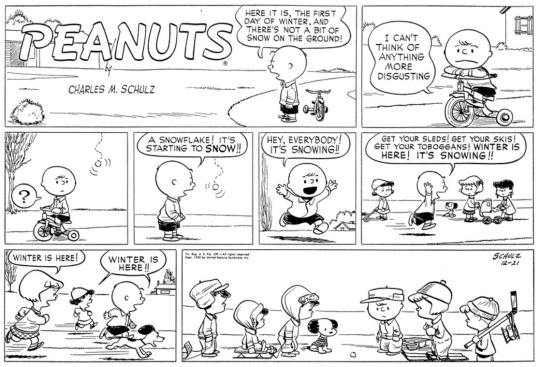
I mean, it's more than I've gotten this year.
Dec 23, 1952

One of many things that I think sets Peanuts apart from other strips is how well Schulz depicts depression (probably because he almost certainly suffered from it). You might think depression is just a sad feeling similar to grief but it's actually more of an irrational pessimism coupled with a persistent sense dread. Your brain doesn't exactly lie to you but instead tells you the most negative version of the truth possible which can lead you to some very irrational conclusions. You feel fine, it's the ~world~ that's broken (and keeps giving you these useless pennies).
Er, not that I know anything about all that.
Anyways, Schulz perfectly captures this in a way that's honest and sincere but also entertaining and kid-friendly. Which is pretty damn impressive when you think about it.
Thoughts:
End of the year character design recap time!
Again, not doing every character every year for my own sanity since the cast will be getting very large. CB and Snoopy will be constants but the rest will get rotated in/out:
Charlie Brown

October 1950

December 1950
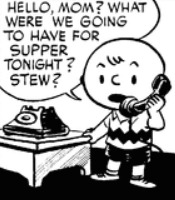
December 1951

December 1952
Snoopy

October 1950

December 1950

December 1951

December 1952
Lucy

March 1952
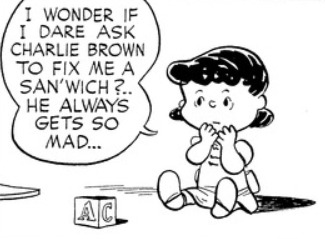
December 1952
(why can't I make this one picture smaller? Am I doing something wrong?)
Linus
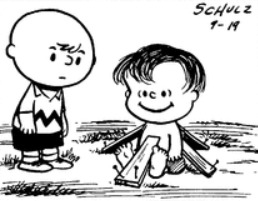
September 1952
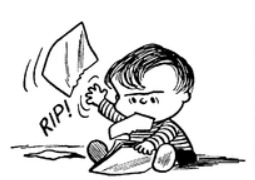
December 1952
Schroeder

May 1951
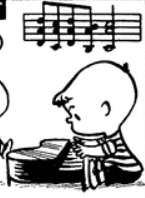
December 1951
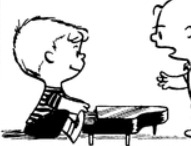
December 1952
The main thing I'm noticing is that everybody looks twice as old as they did last year while the expression work is getting a bit more complex and nuanced. Charlie Brown's head is literally half the size it was in 1950, Schroeder has aged up into an actual character and has shed a lot of his UPA stylization, Snoopy's face is becoming a bit more blocky and angular, and Lucy's eyes no longer make her look like some kind of cursed doll. Big improvements all around I think.
Linus... got a shirt. Look it's only been 3 months what do you want from me?
There's also a lot more detail in the backgrounds now which is creating a wonderful sense of these characters existing in an actual environment. Schulz is also surprisingly good at drawing plants and nature which adds a nice organic softness to his world. It's all actually making me kind of annoyed at the animated adaptations because they always go for something loose and minimalistic for their backgrounds and I think they would have really benefited form the contrast something more solid and detailed would have provided.
Finally his paneling and compositions are god tier. I mean, god damn.

Anyways that's it for 1952, I hope you all enjoyed it. Next up: 1953!
#peanuts#charlie brown#comics#charles schulz#comic strips#peanuts comics#lets read#patty#snoopy#shermy#schroeder#violet#lucy#linus#depression#1952#1950s
14 notes
·
View notes
Note
Ur dabi + endeavor takes are A+ I'm so sick and tired of dabi stans saying "tHe OnLY dIFFeREnCe BETweEn dAbI and HaWks is tHaT dABi is A ViLlain aND HaWks iS a hERo" like wut? Excuse me???? In what world is the crazy serial killer who gets off on murdering innocent people and literal children the same as the guy who killed one equally fucked up bastard who also killed innocent people and children?? I saw someone literally say "if you can condemn dabi for killing 30+ innocent people you have to condemn hawks for killing twice" this person went on to argue that, despite all of twices previous crimes, hawks only killed him to prevent him from doing more killing - that he killed twice for a crime he hadn't committed.??? Again. Wat? Twice had murdered before and he was obviously willing to do it again? He wasn't some poor innocent bystander. Idk. Villain stans are are reaching so hard it's pathetic. At least think before posting this shit smh
I don’t know HOW they managed to delude themselves into beilving that BNHA is a gritty, hyper-realistic Seinen manga with no clear good guys and bad guys.
How they managed to look at a terrorist and the spy trying to stop a terrorist organization and said: “yup, the only difference between the two is the ~villain~ and ~hero~ titles”.
How they managed to look at serial killer killing innocents and an agent killing a dangerous terrorist who refused to surrender and said: “yup, there is no difference between the morality, the motivations and the outcome of these killings”.
Apparently; the new cool way to look for nuance in a story is: stripping the characters from all their nuances.
Amazing.
No one does “mental gymnastics” like these villains stans, man. They are the ultimate champions. They won all the golden medals. Everybody else go home, you can’t even compete.
11 notes
·
View notes
Text
I am so unbelievably tired of people who hate on Carolina. Like... You can have a character you don’t like without actively hating on them. Literally nobody asked. If they did ask, then why put your hate of said character in a place where people can love the character will look? Like????
“I’ll try not to talk about my hatred of Carolina” in the tags of your post that’s also tagged “agent carolina” literally tells everybody who likes her enough to follow that tag that you hate her, and for what? There’s no good fucking reason. I’m tired of it. Carolina hate has permeated this fandom since the day she was introduced, and I’m just... so fucking tired.
It’s not as bad as it used to be. It really isn’t. But now it’s a “Well I hated her before but I like her current arc” and her current arc is literally permeated with her own self loathing - a self loathing that nobody fucking argues with. Her labyrinth scene almost killed everything for me, because it’s such a biased and awkward viewpoint of her during the project that strips all of the nuance of what all happened and only serves to exhibit a deep and underlying self-hate and literally nobody fucking argues with it. But THIS is the version of Carolina that people like. THIS is the version of her that doesn’t attract as much hate. The version of herself that deeply and fully resents herself for actions she took that she genuinely believed were in her best interest at the time - possibly even in the best interest of the group.
PFL runs the absolute flaw of focusing more on their side characters than who RT themselves claimed was the main character of the PFL arc (carolina, in case you didn’t gather), to the point where Carolina’s actions seem random and/or inexcusable, and you have to gather her motives from a deep contextual review. I mean, don’t get me wrong, I love getting to know more about York, North, and Wash, but when you show scenes with them at the cost of making your “main character” more obviously sympathetic, you’re setting her up for this.
I just... I’m so fucking tired of feeling like I need to defend my love of Carolina. I’m so tired of people brushing me off as just “oh, she’s your favorite, i get that you think she was okay back then”, like??? it’s more fucking complicated than that! I just.... I don’t want to talk to anybody about freelancer anymore because that... comments like that are meant to keep the peace but they cut so deep because it just reminds me how dirty they did her and how nobody understands her and i just...
I love her so much but I’m tired of feeling like i’m the weird one for it, aha <8)))
I tried to write her detailed bio in a way that expressed her side more for anybody who actually reads it at least. I don’t know if that helped but... I tried. I put in my effort. It just hurts, because I’m reminded of the aggressive vitriol that was flung at carolina fans back in the day. I’m reminded of the bias, of “well carolina isn’t allowed to ship with anybody but york can fuck everybody also CT and south are a canon pair now apparently so if you ship with one of them you’re causing problems” as just one example and I just... I’m so tired. I’m so fucking tired. I don’t want to have to convince you to see the redeeming qualities and the deep nuance of my character. I just want to have fun.
edit: aha i’m literally tearing up over this i can’t express how awful things were back in the day and how much it hurts to see that the only thing that’s changed is that people have gotten quiet about it. I’m tired of having to go into every encounter scared that I’m going to face it again. just... check it at the door, please???
#(rant post sorry)#(it is fandom related but it's a lot of olllllld salt)#(I'd just forgotten why I don't look up carolina's tag <8) )#>> out of character;;#tbd;;#negativity //
3 notes
·
View notes
Text
why are you being like this?
people i’ve met - they’re not like you. they don’t care. i don’t matter.
don’t ever think that. we all matter.
just some meandering thoughts on where the thematic center of merlin bbc lies for me, and how it weaves itself in and out of my fandom experience.
under a cut because this is a) sort of long and b) not really directed anywhere but my own brain, as i keep thinking about and creating for this show.
[as always, before i get rolling, a reminder: when i write about how i engage with this show, it’s just me talking about what gives me, personally, the most satisfaction or enjoyment, not the way i think everybody should do things. if this isn’t your particular read, please feel free to scroll past. i am not ever going to bother anybody for engaging with this show in their own way, so please don’t worry about it if we are not on the same page.]
that post about kilgharrah really got me feeling things.
i struggle a lot with the sort of...non-nuanced ‘fuck kilgharrah/fuck gaius/fuck arthur/fuck whoever’ mode of engagement that i sometimes run across in fandom. (and i’m not saying there’s anything intrinsically wrong with it; if you have the most fun engaging with the show in that way, please continue to have fun. i’m just writing, on my own blog and in my own space, about what i personally do or don’t find compelling.)
i struggle with this mode for the same reason that i struggle with the whole ‘fuck yoda!’ narrative that pops up sometimes in tumblr’s star wars fandom. because it’s not the narrative that the story is actually trying to create, and though this fact doesn’t mean you can’t twist things that way if it gives you more enjoyment, for me, there’s nothing about it that feels good.
writing fictional characters off like this, when the narrative is clearly not asking us to do so, feels...frustratingly false, and externally-imposed, as if characters are being evaluated based on the exacting standards of a universe in which they never lived, in a context where they were never intended to exist. doing so requires you to willfully ignore what the story is actually trying to say, and it’s fine to go ahead and do that if you want, but for me it strips away so much of what makes the story meaningful.
bbc merlin’s core plotline is about believing in someone’s better nature. the central storyline is that merlin commits himself to someone who doesn’t always give merlin reason to believe that this commitment is worth it, and yet still there’s always this hope and faith and belief that one day arthur will make it right.
and this is presented as a worthy choice. are there problems with it? of course. the show knows that, and it gives us places to think about that. but even with this being the case, the ultimate message of the show is still never that this commitment was useless, worthless, or foolish. the message of the show is that under the right conditions, people grow. this show says that when we are given deep love, care, and companionship, we can change for the better. it says that people, under the right conditions, can learn how to be better than they were before, and that everyone deserves the opportunity to grow into the person they were meant to be.
bbc merlin is not asking us to cancel any of its characters, ever. that is never the show’s intention. i won’t try to stop anybody from doing that, if that’s how they have more fun watching the show, but i am still going to contemplate, in my own space, how small that makes the story feel for me.
sometimes i see things like ...‘morgana/gwen/whoever is the only valid character in merlin bbc,’ and i just...first of all, neither of them are perfect, okay, and second of all, it doesn’t MATTER, because that has never been the point of the story. this story is not asking us to rank characters on a scale of how righteous/unproblematic we think they are. it’s asking us to CARE about the characters - ALL of the characters - and to root for them (yes, ALL of them), in the fullness of their imperfection.
when i explore the wider fandom, i typically bump up against one of two mindsets. there’s the shipping mindset, where everybody loves arthur and he’s helplessly in love with merlin. but i don’t want that mindset (because i don’t ship that pairing), so i look elsewhere. but the other mindset is an attitude that dislikes arthur, full stop. and i don’t want that either!
this ‘either/or’ divide is the opposite of what bbc merlin is asking us to do with its characters. i criticize arthur all the time, but i still don’t think the story is asking me to reject him. and i don’t WANT to reject him, either - why would i even watch this show, if i didn’t think it was important to see him become who he was meant to be, if i weren’t invested in his growth, if i didn’t ultimately believe in his possibility? if i didn’t think the show was asking me to root for him - not uncritically, of course; the show is never asking me to do that - but with the core understanding that arthur is somebody worth caring about?
the same goes for morgana. the show never asks us to write her off. up until the very end, the show wants us to care about her. the show wants us to root for her. the show never asks us to forget that she and the other characters used to love each other; it never tells us to stop wanting morgana to get what she needs.
gaius, too - the show never wants us to kick him to the curb. it knows he’s not perfect. he knows he’s not perfect. he tells merlin, when talking about his own life, “there has, for the most part, been very little purpose to it.” but the show doesn’t want us to fixate solely on his failures, or to dump him for his more cowardly moments. the show wants us to know that he still has value. it wants us to know that he is doing more good in the world now than he did before, which is all we can ask of a person, in the end. it wants us to know that he cares, and that he is trying.
and kilgharrah - the show is never asking us to hate him, either! yes, i get that it’s funny to joke about how “unhelpful” he is; i think that stuff is funny, too - but i also think it matters to understand that in canon, in the show, we are not meant to read kilgharrah as a malevolent figure. we are not supposed to read him as a villain. we are supposed to care about him. we are supposed to understand that he, too, is working, ultimately, for the triumph of Good. even though his version of this may feel convoluted to us, because kilgharrah isn’t human and can’t possibly be evaluated by human standards, we are supposed to understand that he, too, is trying. we are supposed to be moved when merlin asks him, “what will i do without you?”
we are supposed to care about all of them. we are supposed to find all of them worthy. we are not supposed to evaluate them (and then discard them) according to inflexible, merciless, decontextualized standards imported from a non-merlin-bbc world.
and this doesn’t mean people aren’t still allowed to do that, if it’s fun for them, but for me, analyzing this show outside of its context doesn’t bring me any satisfaction. we can go ahead and say things like ‘arthur should get his head chopped off’ and like, okay, that’s funny as a joke. but as an actual analysis of the show - as a sincere interpretation of the story - it fails. it’s devoid of all context. we aren’t supposed to be evaluating this story from the perspective of ‘let’s overthrow the monarchy, kings should die, etc etc.’ the context of merlin bbc is that albion is waiting for a righteous monarch, and that this is a desirable, acceptable, correct thing, in the context of that world. we are supposed to understand that arthur IS the once and future king, and that this IS a good thing, in this universe, and that the journey we are on here is one where he becomes worthy of his seat on the throne and then ushers in a time of peace and justice for all of albion’s people.
(and as i’ve said before - this is why the merlin bbc finale is so stunningly bad. it’s not that the show subverts our expectations, it’s that it annihilates its own story, which it has been consistently telling for sixty-three episodes.)
that aside, though - this same overlooking of contextual nuance is the reason why i don’t connect to takes that consider ‘oh no, merlin kills people!’ to be evidence that he’s “changed,” “gone dark,” or “lost his soul.” merlin does go through a dramatic (and tragic) change by the time we hit season 5, but what happens to him has nothing to do with the fact that he’s killed people. the context of this show isn’t one where killing is a universal evil. killing in battle or for the purpose of self-defense is not a morally problematic choice, in this world. merlin, like everyone else in this show’s context, understands this, and killing a group of enemy soldiers to protect his own life is not something the show intends for us to interpret as an erosion of his humanity.
what IS framed as an evil act, in the context of merlin bbc, is when someone chooses to kill despite the fact that mercy is an option. if arthur had killed odin when he could have instead made peace with him, if arthur had executed annis’s champion or vivian’s father when he had already defeated them in single combat, if merlin had killed kilgharrah whilst having absolute power over him - those are morally bankrupt choices, in merlin bbc’s context.
we’re not supposed to see things like merlin killing agravaine as evil decisions. in the context of the show’s world, killing agravaine is a necessary, morally uncomplicated act. it isn’t something merlin wants to do, certainly, and he tries to avoid it, and he doesn’t strike back until agravaine tries to kill him first, but ultimately this moment is not supposed to be illustrative of merlin turning down a dark path. it’s grim, sure, but in the context of the show - in the context of the era - it’s nothing more than the justified wages of aggression. agravaine brings this fate down upon his own head. merlin is not a pacifist, and neither he nor anyone else would expect himself to just stand there and let a group of enemy soldiers murder him when he could instead kill the soldiers and get away. that’s nonsensical and utterly decontextualized. it’s not an expectation that anyone in-story would have, nor a standard that merlin (or anyone else) would hold himself to.
all that aside, though -
the issue, for me, in summary, is just that i think sometimes we...evaluate this show in ways that it really isn’t meant to be interpreted, without considering the story’s context or thinking about what the story’s actual intent is. and i think that these decontextualized interpretations are often less generous than what the show is actually trying to say to us, and that sometimes we write characters off when the show absolutely is not asking us to do that.
and of course, nobody has to listen to what the show is trying to say if they don’t want to. if it brings someone more enjoyment to pick one character to stan and say ‘the rest of these characters are Bad People and i’m not interested in them,’ then that’s fine! whatever floats your boat.
it just doesn’t float mine.
the point of this show, for me, is that everybody deserves a chance. the point of this show is exactly what merlin says to daegal in the woods, even as daegal is leading merlin into a trap: we all matter. the theme at the heart of this story is that it is possible to love someone who doesn’t deserve it, and that this can be a worthy choice, a transformative choice, a powerful choice - not necessarily a perfect choice, or even the right choice, maybe, for the person making it, but still a choice that holds value, a choice that creates something good in this world, even at cost.
listen to me, clotpole. i don't care if you die, there are plenty of other princes. you're not the only pompous, supercilious, condescending, royal imbecile i could work for; the world is full of them. but I'm going to give you one more chance.
should merlin have done that?
we can debate that forever. i am critical enough of arthur pendragon myself, when it comes to merlin’s well-being, and i could easily argue that no, merlin shouldn’t have given arthur as many chances as he did; he shouldn’t have stuck around; he shouldn’t have offered so much of his life to someone who continued to make arthur’s kind of mistakes.
but i think it matters to remember that in canon, thematically, the story’s answer to this question is yes. mercy, in this story, is the most noble gift a person can bestow on someone else, and i think we are asked to bestow this same kind of mercy on the show’s characters, heroes and villains alike. we aren’t ever told, in this show, that some of these characters “weren’t good enough” to deserve their chances. we are told that in this world, compassion is always worthwhile. love is never wasteful. it is never foolish to care for people, even and especially when they aren’t yet their best selves. giving someone a chance does matter. choosing to care does make a difference, in the end.
people don’t have to import these themes into their own personal analysis, by any means. but i am still committed to remembering, in my own work, in my own space, that when we raise the question “was it worth it” in reference to whether these characters truly deserved to be loved, or trusted, or given a chance to grow - the story’s answer is unequivocally yes.
#the once and future slowburn#meta#i don't know what this even IS#i'm just feeling so emotional about this show right now#i love it so much#and i can't love it piecemeal#i can't#i has to be everything#or the message doesn't hold#the show doesn't want us to pick our faves and toss out everybody who doesn't measure up#it wants us to listen when merlin says 'we all matter.'
19 notes
·
View notes